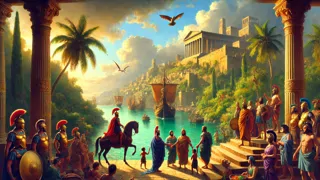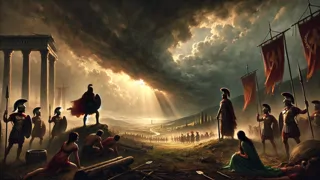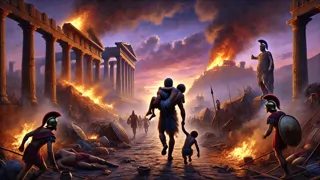Introduction
Before the marble cities and echoing forums of Rome, before its emperors and legions marched as masters of the world, there was a story of flight and hope. It began in the burning ruins of Troy, whose battered walls and fallen towers glowed in the last lights of a ravaged night. From ashes and mourning, one man emerged—Aeneas, a prince and warrior, his fate marked not by triumph but by endurance. He did not choose to live in comfort or certainty. Instead, he obeyed the urging of gods and the heavy ache in his chest that whispered of a future yet unseen—a promise of a homeland on distant shores, not for himself but for generations yet unborn.
Aeneas’s journey was never his alone. His path wound alongside grieving Trojans, elders who remembered fortunes lost, youths whose dreams lived on the sea winds, and children who played among collapsed temples, still clinging to hope. His father, frail yet dignified, was carried on strong shoulders. His young son, Iulus, gazed forward with innocent resolve. At every turn, gods interfered and fate pressed close—Juno spurred storms and hatred, Venus offered solace and guidance, and Jupiter’s will loomed, inexorable and vast. Their voyage cut through the wild blue of the Mediterranean, across islands haunted and harbors treacherous, shaped by storms, monsters, trials, and moments of near surrender.
Every step forward was bought with sacrifice. Friends were lost to violence and fatigue. Love bloomed unexpectedly—then withered in the push of a greater calling, as seen with Dido, queen of Carthage, whose tragic heart bled for Aeneas’s unbending course. The ghost of Troy followed them, yet so did the hope of Rome—a city yet to be, shining beyond battles and endless wandering. Through each hardship, Aeneas’s perseverance deepened, his choices defined not by glory but by relentless responsibility, forging together sorrow and promise, memory and aspiration.
This is more than a hero’s adventure; it’s the forging of a people, the transformation of suffering into destiny. In these ancient footsteps, we glimpse the first foundations of Rome, laid not with stone but with dreams and agony, and held by a spirit that would one day conquer time itself.
Flight from Troy and the God-Tossed Odyssey
The last lament of Troy echoed in the blackened alleys, carried softly on a night wind that smelled of smoke and sorrow. At the city’s heart, Aeneas lingered, his breath shallow with grief. The prophecy haunted his ears: Rome awaited, far away—not for him, but for his descendants. Still, every memory threatened to pin his feet to the hot stones, every dying ember a world he once knew. But fate, embodied in the vision of his dead wife, Creusa, and the insistent calls of his mother Venus, pressed him onward. Family and survivors gathered beneath his protection. His father Anchises, once proud, now frail, was carried upon shoulders grown strong on duty. Iulus never left his side, carrying the promise of a new lineage in his hopeful gaze.

Dawn scattered gold upon their exodus. Navigating shattered streets, Aeneas brought forth what remained: household gods, battered relics, and the pain of many lifetimes. In the open, Troy stretched before them—every avenue lined with mourning faces and heaped possessions. Hektor’s ghost had once urged Aeneas to save his people, not the city, and now every step felt as heavy as betrayal. But Aeneas knew—Troy was not just walls, it was the living hearts that walked beside him.
The coast called, and a battered fleet awaited. Into salty foam, Aeneas and the Trojans pressed, fearing both pursuit and the unknown tides. The Mediterranean was no simple passage—it became a test crafted by gods. Juno, bitter over her thwarted plans, conjured storms fierce enough to splinter ships and hope alike. On nights blacker than pitch, thunder shattered sleep; on days windless and sweltering, the sea stilled into a breathtaking monotony, stretching endlessly, testing each heart’s endurance. Hunger gnawed their bellies, illness thinned their ranks, and not all made it to the next morning.
Each island held its own trials. Thrace was haunted by gruesome omens; Pergamum’s promised soil brought only disease and death. Aeneas’s mother, Venus—both protector and distant—sent portents and cryptic dreams, guiding them ever onward. They lost Polydorus to violence, buried Anchises on the green slope of Sicily, and mourned at every stop. Yet among so much sorrow, bonds of trust and kinship deepened. The journey wasn’t heroics—it was the stubborn refusal to yield, to falter before the unknown. Every landfall brought fresh uncertainties, but also moments of rest, laughter, even joy. Aeneas learned to read the moods of the sea, the hidden meanings in divine messages, and to lead—not with iron will alone, but gentleness and care for those depending on him.
Carthage, at last, glimmered on the horizon—a city wealthy, flourishing, and ruled by Dido, a queen as exiled by fate as any Trojan. In her welcoming halls, the Trojans found shelter, food, and for a while, relief from suffering. Between Aeneas and Dido, affection blossomed—two sovereigns divided by grief, yearning for stability. But love, too, became a battlefield. The gods, remorseless, intervened: Mercury reminded Aeneas of Italy, the future, and his sacred duty. Leaving Dido behind tore at his soul. Her lament, her curse, and the flaming pyre that followed, forever haunted the Trojans’ rearview. Love and destiny seldom aligned, but Aeneas pressed forward, the hope for a greater Rome burning brighter—always just beyond reach.
Trials, Losses, and Prophecies on the Path to Italy
Departure from Carthage sent Aeneas and his followers once more into the hands of fate. The golden sails fell silent in gentle winds as the horizon beckoned—a horizon etched by both promise and dread. Storms often returned, lashing out in divine fury, but the greater battles were internal. Anxiety gnawed every heart as they approached the haunted shores of Sicily and shadows lengthened behind them. The vision of Dido’s anguished face clung to Aeneas’s mind. Some nights, he startled awake, the echo of her curse a bitter taste on his tongue. Yet he pressed on, compelled by both love and duty, the prospect of Italy growing like a beacon beyond the tempest.

Sicily became a grave for the old. Anchises, the pillar of Aeneas’s resolve, perished there. His death left a wound that bled into the hearts of his family and followers. Anchises’s funeral was made with borrowed rituals, its pyre blazing by the sea. In dreams, Anchises’s spirit returned to guide his son, revealing cryptic secrets and joys yet to be found in Italy. Even so, the path was never straight. Mythic monsters stalked the journey—harpies whose curses stunted crops and hope, whirlpools seething with malice, and the twin terrors of Scylla and Charybdis who tore ships and lives as easily as leaves.
On Italian soil, the Trojans faced not the peace they dreamed, but prophecy layered upon prophecy, each as tangled as the olive roots in Latium’s hills. In the Cumaean caves, Aeneas sought the counsel of the Sybil, the mysterious oracle whose words seemed both a guide and a warning. Her voice resonated like thunder underground as she demanded gold and promises. She led Aeneas to the entrance of the Underworld—a yawning maw shrouded in mist. Here, amid flickering shadows and echoing regrets, Aeneas walked among the dead.
The Underworld revealed both terror and comfort. He saw again the ghost of Dido, silent and distant, eternally walking away from him, her forgiveness as elusive as the sun in Tartarus. Heroes and war-dead stood at the riverbank, offering Aeneas warnings and hope. Anchises appeared, no longer weak, but shining with the wisdom of the grave, unveiling a vision of Rome’s destined greatness. Through Anchises’s prophecy, Aeneas glimpsed battles to come, found new resolve, and accepted both suffering and glory as the twin pillars of his duty. He emerged exhausted, but changed, bearing the weight of destiny and the bitter gift of foresight.
No sooner had they rejoined the living than mortal conflicts flared. The Italian mainland proved as hostile as any storm. Latinus, king of the Latins, welcomed Aeneas, prophesying that his daughter Lavinia should choose a foreign husband. But Turnus, a proud and tempestuous prince, claimed Lavinia by right and bristled at this foreign competition. War loomed, spurred by angered goddesses and Sicilian omens. The Trojans built their new settlement, joining with local peoples, but violence was inevitable. Friendships grew among the Trojans and Italians—Aeneas found loyalty in the fierce Evander and his son Pallas, whose death at Turnus’s hand would later burn a brand of sorrow into Aeneas’s resolve. The fields of Latium ran red, and the final act drew near: a people forged in exile, prepared to defend their hope to the last breath.
War, Cost, and the Dawn of Rome
With harsh clangor, war ignited across the Italian hills. The lands of Latium knew exile and suffering, but nothing prepared them for the severity of the coming conflict. The ambitions of Turnus, inflamed by wounded pride and divine intervention, set brother against brother. Aeneas forged alliances with those willing to see beyond blood—Evander and his Arcadians, the Etruscan lords sickened by Turnus’s savagery. Lavinia, source of so much strife, remained an enigmatic figure—her silence as heavy as a judgment, her future emblematic of the very land’s fate.

Armor gleamed in dawn’s pale light, shields hammered into shape beside makeshift fires. The Trojans—so long wandering—built their new settlement with weary hands but vigilant resolve. Each sunrise brought the threat of assault; each sunset, the sorrow of friends fallen. The bracing air of early battles was soon thick with exhaustion and smoke, and the songs of the hopeful gave way to the grit of survival. Into this chaos, Aeneas strode—ever the leader compelled by sorrow and hope. His war was waged not only with swords, but with the steadfastness that binds men to an idea larger than themselves.
The fates conspired, and Aeneas faced impossible choices. He mourned the death of Pallas, the young prince entrusted to his care—his armor brought to him stained and battered. Fury mingled with grief, and for a moment he was tempted by vengeance, the same darkness that undid Troy. Yet time after time, Venus’s voice stilled his rage. Juno, unable to crush destiny, at last relented—demanding only that the new people cherish the Latins, that Rome be born of both Trojan spirit and Italian earth.
The climax thundered outside the city gates. Aeneas and Turnus, both stained by suffering and guided by their own gods, met in single combat—each a vessel for the dreams of countless others. They circled beneath storm-bruised clouds, the clatter of their arms ringing out, hope and ambition balanced on each blow. Fate would not be denied: as Turnus fell, Aeneas’s blade hovered, mercy and retribution entangled. But the sight of Pallas’s stolen belt hardened Aeneas’s heart one final time—a reminder that peace can demand bitter sacrifices.
From the ruin and loss, amidst the toll of the dead, a new city began to rise. Lavinia stood by Aeneas, their union cementing the peace between peoples. The Trojans became one with the Latins, their customs blending over years into the beginnings of the greatest city the world would know—Rome. The heirs of Aeneas would carve their story into history: through hardship, unity, the vision of a new world brought to life. The cost was enormous, but so was the triumph—a city eternal, founded by the journey of exile, loss, and an unwavering commitment to destiny.
Conclusion
From ashes and exile, an unyielding spirit drew new boundaries beyond the wreckage of Troy, forging a promise as enduring as time itself. The journey of Aeneas, marked by heartbreak and resolve, closed with neither simple victory nor sorrow, but transformation—out of suffering and sacrifice, the seeds of Rome were sown. Those who followed him, bound by memory, pain, and hope, crafted not only a new land but a legacy enduring vast centuries. In the threads of his trials—dauntless voyage, torn loyalties, loss confronted with perseverance—we glimpse the heart of a people who would shape history. Their mosaics of gods and dreams, their reverence for family and fate, still resonate in Rome’s stones and soul today. The story’s lessons are clear: greatness asks more than glory; it asks courage, duty, and the willingness to endure for the sake of others. Aeneas’s legend endures, written into the very foundations of civilization, reminding us that from adversity’s shadow grows a light strong enough to outlast empires themselves.


















